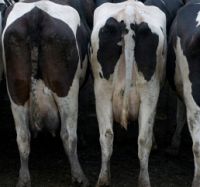

A pill that will stop cows producing flatulence could be the answer to reducing methane emitted as the animals turn grass into milk, and which significantly contributes to climate change. Methane produced by cows worldwide currently accounts for 4% of greenhouse gas emissions, a figure which is set to rise as populations and meat consumption increase. Scientists from the University of Hohenheim in Stuttgart are working to develop a pill, known as a bolus, that in combination with a special anti-flatulence diet can reduce the amount of methane produced as part of the natural grass fermentation process in the cow's stomach.
Climate change issues were the main driving force behind the research, which should also increase the cows' metabolism and improve their wellbeing. Test subjects will be fed large fist sized pills that sit in their rumen - the first of the animals four stomachs - to reduce emissions of methane and bacteria found there. Methane is over 20 times more effective at heating up the earth's atmosphere than carbon dioxide, and is responsible for around a fifth of the warming observed at present. Scientists have estimated, that cows and other livestock contribute just under 20% of total methane emissions caused by human activities, and are therefore responsible for some 4% of the global warming phenomenon so far.